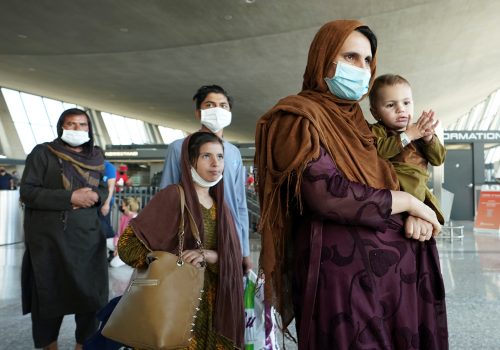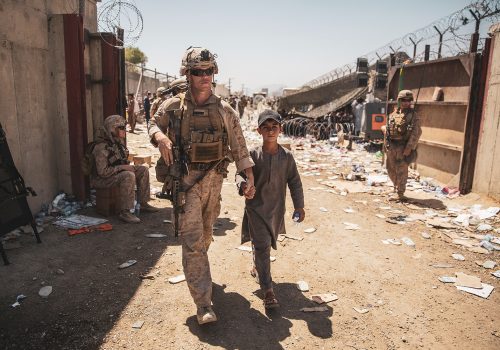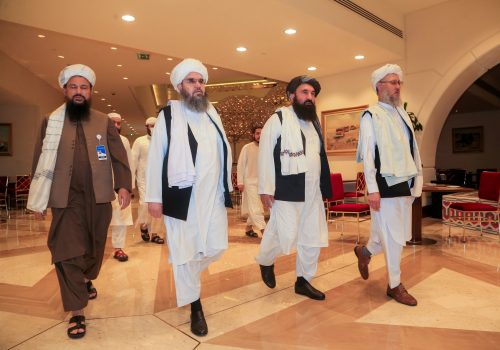Experts react: 2021 Shanghai Cooperation Organisation (SCO) summit in Tajikistan
On September 17, the Shanghai Cooperation Organisation (SCO) held a heads-of-state summit in Dushanbe, Tajikistan, in a hybrid virtual and in-person setting. Consisting of China, India, Kazakhstan, Kyrgyzstan, Pakistan, Russia, Tajikistan, Uzbekistan, and most recently Iran, the SCO meeting primarily discussed the evolving situation in Afghanistan and its ramifications for member states as well as the international community more broadly. The confirmation of Iran as a new, full member state also dominated headlines since last Friday.
The summit comes amid an evolving geopolitical landscape in South and Central Asia. Tensions simmer between rivals India and Pakistan as well as Washington and Beijing, something that continues to shape their respective stances towards South Asia’s nuclear hegemons. In addition, the reduced role of the United States in the region–exemplified by the US withdrawal from Afghanistan–also puts a spotlight on regional cooperation and convening bodies such as the SCO that will likely have a greater role moving forward in the affairs of member states.
Atlantic Council experts present their analyses of the summit below:
Tajikistan seems to have taken a lead in connecting Central Asia to South Asia
Here in Dushanbe, with President Putin and President Xi missing out on attendance in person, Tajikistan took the lead and opportunity in hitting out at the Taliban and demanding a more inclusive government and taking advantage of a newfound relationship between Pakistan’s Prime Minister Imran Khan and Tajikistan’s President Emomali Rahmon. Tajikistan sought to get more guarantees from Pakistan in pressuring the militant group now in control of Afghanistan. Tajikistan also took time to bring up the issue of Panjshir and how it was the pivot on which it would judge the region’s effort to bring the Taliban to account.
Iran’s full-time entry into the SCO keeps the tradition of an evolving group increasingly seen as a China-led security and economic bloc. There was particular attention on the haphazard withdrawal of the United States and a need for the region to take control of its own destiny and not cater to the demands of the United States or NATO in its backyard, i.e., Afghanistan. Iran and Pakistan continue to push for a regional economic model that would circumvent the respective sanctions and restrictions such as with the FATF. The headlines were dominated by a need to do more on Afghanistan and for the region to coordinate, better seen as a dig at India, Pakistan, and Iranian tensions on the future structure of the Afghan state. Tajikistan seems to have taken a lead in connecting Central Asia to South Asia and has a newfound confidence despite being the poorest of the Central Asian states. It has taken a decisive stance on Afghanistan yet forges closer links with Pakistan with the backing of Russia and China.
Kamal Alam is a non-resident senior fellow with the South Asia Center as well as adviser and representative of the Massoud Foundation in Pakistan which looks at the legacy and work of Ahmad Shah Massoud.
It no longer takes two to tango: Afghanistan and the SCO
What stands to threaten SCO’s collective vision of socio-economic development is an Afghanistan under Taliban rule, inching towards an abyss. While the abyss will stare back at the Taliban, Afghanistan’s immediate and larger neighborhood will not be able to escape the disastrous consequences for regional peace and stability once that happens. It is heartening to note that Prime Minister Imran Khan in his address at the 20th anniversary meeting of the SCO informed member states about Pakistan’s vision of peaceful coexistence by avoiding bloc politics, however, it is not certain if all SCO countries share Pakistan’s vision of cooperation instead of confrontation especially with respect to the current Afghanistan crisis.
The Dushanbe Declaration, adopted at the SCO summit, included a section 3.1 on Afghanistan and regional security. Member states reaffirmed their support for “the emergence of Afghanistan as an independent, neutral, united, democratic and peaceful State, free of terrorism, war and drugs… (and) that it is critical to have an inclusive Government in Afghanistan, with representatives from all ethnic, religious and political groups of Afghan society.” While the other members played it safe, Pakistan, China, Iran, and Russia sought accountability from Washington for gifting the region with a chaotic Afghanistan post-US withdrawal and demanded US engagement with the Taliban for the reconstruction of Afghanistan. And, rightly so! Why should only the countries in Afghanistan’s immediate neighborhood share the burden of ensuring that there is no economic collapse there? The United States needs to be held accountable for $2 trillion dollars spent in Afghanistan with nothing to show for it after twenty years. Despite $87 billion spent on training the Afghan military and police force, 300,000 strong and armed with the world’s best military equipment, they could not survive direct contact with 60,000 Taliban fighters beyond eleven days and surrendered. The United States spent $24 billion on economic development in Afghanistan but the economy inherited by the Taliban is in shambles, pushing the country into a disastrous humanitarian crisis.
Rebuilding Afghanistan, rehabilitating its economy, and ensuring that the Taliban understand what ‘inclusive’ means according to Western ideals, is not the burden of SCO countries, especially Pakistan, China, Russia, and Iran, to bear. If the Taliban are reaching out to the rest of the international community and trying to understand how to translate ‘inclusiveness’ into a language they would understand before they adopt it, does the rest of the world have an inclusive plan to assimilate the Taliban not only regionally, but globally? It takes two to tango.
Afghanistan’s reconstruction, development, governance and humanitarian relief is not a one-way street. The Taliban have nothing at stake. They can go back to their old ways. But can the world around them afford to regress to the abyss that stared at us twenty years ago? Time is of the essence and it would take collective efforts involving multilateral stakeholders, especially those responsible for the chaos, to lead from the front.
Dr Rabia Akhtar is a non-resident senior fellow at the Atlantic Council’s South Asia Center and Director of the Centre for Security, Strategy, and Policy Research at the University of Lahore.
Iran’s acceptance to the SCO was a decisive move for an organization known for its member states’ competing interests
The headline from last week’s Shanghai Cooperation Organization (SCO) summit was the decision to admit Iran as a full permanent member. After decades serving as an observer, Iran joins the SCO in its broad agenda of regional security, economic and humanitarian cooperation. In Tehran, the move is largely touted as potential to join markets which represent 20% of world GDP. While Iran has hopes of strengthening economic cooperation within SCO, key members, such as Russia and China, will not jeopardize trade with the United States, Europe, and Arab states while it remains an FATF sanctioned state. Iran’s acceptance was a decisive move for an organization known for its member states’ competing interests as well as disparate economies and governance structures.
All parties expressed a commitment to combatting the “three forces” of terrorism, separatism, and extremism, and the joint-military exercises scheduled next week are part of SCO’s ongoing counterterrorism drills and efforts to create more interoperability between its countries’ militaries.
China’s Belt and Road Initiative (BRI) continues to gain ground. While primarily focused on infrastructure-building activities, the principles of BRI include “five links”: policy coordination, infrastructure building, unimpeded trade, financial integration, and people-to-people exchanges. Taken together, the five links reflect Beijing’s vision of a Sinocentric regional order. While it is impossible to anticipate how this unprecedented outflow of cash and diplomatic ambition will ultimately shape the region, it is worth noting that Beijing strengthened central party hold through infrastructure development in out-flung regions.
The clock is running on a strong potential for a humanitarian crisis in Afghanistan. One month in, the Taliban show little ability to govern a nation. Winter’s confluence with the harsh curtailment of half the population’s economic and educational activity has a dangerous trajectory. Meanwhile, most SCO members want tight borders to stave off the ‘three forces.’ China does not want Afghanistan to become a safe haven for Uyghurs. India has heightened its concerns about militants on its northwestern border.
The great game continues. In the aftermath of the US withdrawal from Afghanistan, Washington is focused on aggressive counterterrorism in the region. Beijing is strengthened in its regional influence yet must work with Moscow to chart how two major powers may cooperate in a restive region known for its intractable conflicts.
Amber Jamil is an international relations professional with a focus on South Asia and a non-resident senior fellow at the Atlantic Council’s South Asia Center.
There is an urgent need for the region (and Washington) to engage in economic creativity to avoid an impending devastating humanitarian crisis and an economic collapse
As the United States determines its mission space in Afghanistan after shifting the Afghan burden to the region, China has reluctantly risen to the occasion. At the recent Afghanistan-focused SCO meeting in Tajikistan, Chinese leaders urged for a neutral, stable, and inclusive Afghanistan under the Taliban.
For Beijing, it is a bitter choice, however.
China, a longtime skeptic of American presence (and withdrawal) in Afghanistan, has only marginally played a not-so-convincing convening role in Afghanistan. Beijing, however, is now attempting to play a consensus-builder in a divided region to establish tactical partnerships of necessity for security/economic stability. To do so, China favors the SCO as a regional forum for regional cooperation among the member countries.
China, meanwhile, also appears to be positioning itself to play the “Big Brother” role to the new Taliban government. While the Taliban are betting on Chinese support, they have not yet established a common language with them. Although China does come across as a more reliable partner to certain Taliban leaders, other factions–including Taliban hardliners–view China with suspicion and disgust. So far, Beijing has only pledged $31 million in in-kind assistance to the Taliban government, a speck of what Washington and its partner used to spend in a day in Afghanistan.
Regionally, too, while Washington has been politically absent, other countries have made their concerns clear. For one, India has questioned the ‘exclusive’ nature of the new Taliban government, urging all partner countries to “think carefully and collectively while deciding on the legitimacy of the new political system in Afghanistan.” Moscow, on the other hand, wants stability in Afghanistan, but couldn’t care less about Afghanistan’s future. Moscow’s desired endstate in Afghanistan, in fact, is for it to become irrelevant—or “another Bangladesh,” as one former Russian official once told me. Yet, it has kept its embassy in Kabul open for tactical engagements.
Most crucially, Pakistan, which got its wish of turning Afghanistan into a pliant half-state, will undoubtedly benefit from bullying decisions and resources from their Taliban clients. But Pakistan, a ticking bomb itself, is also faced with a tough decision tree to determine whether to turn Afghanistan into a somewhat stable participatory country, or steer it into a path of a dead nation run by their Taliban and Haqqani clients. For now, the immediate test for certain Taliban factions is to take a healthy distance from Pakistan–possibly through some sort of a Gentlemen’s Agreement. Yet such distancing would come at an expense for the Taliban, including some Taliban assassinations to ensure compliance with Pakistan’s objectives.
At any rate, there is an urgent need for the region (and Washington) to engage in economic creativity to avoid an impending devastating humanitarian crisis and an economic collapse. Doing so requires a regional economic understanding of Afghanistan, mainly between Pakistan, China, India, Russia, Iran, as well as Qatar, Turkey, and the United States. In the interim, these countries need to unite and mobilize their economic and humanitarian efforts to form a conditional engagement mechanism with the Taliban under the United Nations.
Javid Ahmad is a nonresident senior fellow with the Atlantic Council’s South Asia Center and was, until recently, Afghanistan’s Ambassador to the United Arab Emirates.
The comments of SCO leaders about the road ahead in Afghanistan were short on initiatives to address Afghanistan’s challenges
The main message of the Dushanbe Summit, as far as I could see, was institutional: an attempt to demonstrate that the SCO serves as a focal point for discussion among Eurasian countries. And that was achieved by admitting Iran, thus filling in a gap in SCO membership among major powers of Central Asia. Iran joined a multilateral regional institution for the first time since 1979, and the rhetoric of its leaders was predictable: that this move was giving new strength to those who sought to resist unilateralism (that is, American hegemony) and bring more attention to the economic dimension of the SCO by underscoring potential investment in and trade with Iran (especially by China) as a rebuke to America, to emphasize the weakness of the United States in the post-Afghanistan era.
Notably to me, as someone most interested in the South Asian members of the SCO, were the comments of Pakistani Prime Minister Imran Khan on Afghanistan. He was restrained, noting Pakistan’s need for stability next door; and he called on the Taliban to ensure that no terrorism emanates from Afghanistan. But his comments, and indeed the comments of other leaders about the road ahead in Afghanistan, were short on initiatives to address Afghanistan’s challenges. This lends credence to the critique which has dogged the SCO since its inception two decades ago: it’s a place where leaders talk, but it’s a consensus-based organization, so it’s not a likely source of concrete solutions to the extraordinary challenges of Eurasia.
Cameron Munter is a nonresident senior fellow at the Atlantic Council’s South Asia Center and Europe Center. He is also a senior fellow at the Center for Transatlantic Relations at the CEVRO Institute in Prague. Munter also served as US Ambassador to Pakistan from 2010-2012, where he guided US-Pakistani relations through a strained period, including the operation against Osama bin Laden, while leading a 2500-employee embassy.

The South Asia Center serves as the Atlantic Council’s focal point for work on the region as well as relations between these countries, neighboring regions, Europe, and the United States.
Image: Foreign ministers and officials of the Shanghai Cooperation Organisation (SCO) pose for a group photo during a meeting in Dushanbe, Tajikistan July 14, 2021. REUTERS


